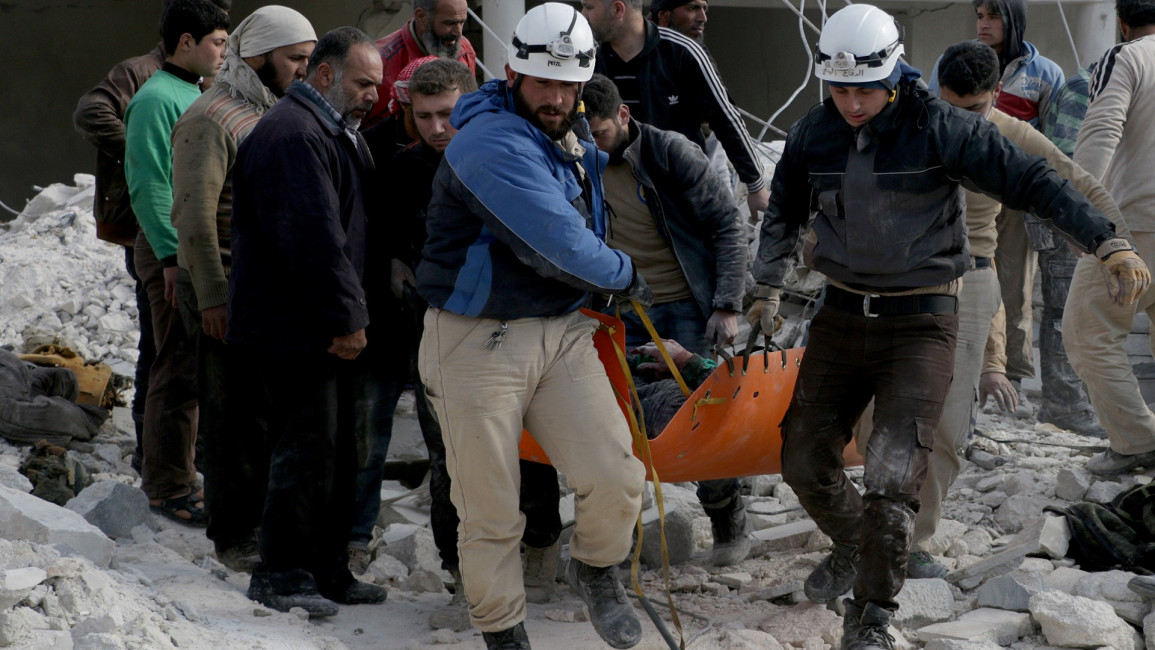Syrian opposition blames Russian, regime escalation for talks failure
They also say there is deafening international silence regarding the Russian-led alliance's violation of international resolution 2254, with record numbers of civilians killed in Russian-Syrian operations the past six days in parallel with the peace talks.
Backed by a wave of Russian air strikes, government forces have advanced this week against rebel positions on the road to the country's second city Aleppo in an offensive that has been widely blamed for suspension of the Geneva talks.
Salem al-Muslet, official spokesperson for the Higher Negotiation Committee (HNC) of the main Syrian opposition umbrella group, blamed the Syrian regime and its backers for the failure of the first round of the Geneva talks.
In remarks to The New Arab, he accused the UN of not being serious about sponsoring a real political process, having failed to compel the regime to implement the humanitarian clauses of resolution 2254, and to condemn its attacks on civilians, torture of detainees and deliberate starvation of Syrian towns and villages it besieges.
 |
Russia is stalling the political process to impose its military solution on the ground - HNC head Asaad Zoabi |
 |
Muslet's comments were echoed by Farah al-Atassi, spokeswoman for the opposition delegation, who held Russia and the Syrian regime responsible for the failure.
Atassi said the regime and Russia continue to bomb Syrian cities and towns despite agreeing to a political solution, and have not made any real steps to ensure the success of the peace negotiations.
Atassi also accused the international community of abandonning the Syrian people.
Russia is stalling the political process to impose its military solution on the ground, said Asaad Zoabi, head of the delegation, to The New Arab.
Zoabi stressed the opposition delegation will not return to Geneva until humanitarian demands are met.
In this regard, informed sources speaking on condition of anonymity said UN envoy Staffan de Mistura has told the Syrian opposition he would be seeking a binding UN Security Council resolution in late February to push for the implementation of resolution 2254 clauses, in order to encourage the opposition to return to the negotiations.
The Syrian government delegation in Geneva, meanwhile, complained that the HNC was disorganised, had not named its negotiators and contained individuals it considered "terrorists".
Bashar al-Jaafari, chief government negotiator, blamed the suspension on opposition "preconditions" and said de Mistura announced the break only because the HNC was about to leave.
 |
The fighting has seen an escalation and regime forces bear the responsibility for that - Frank-Walter Steinmeier |
 |
"Military escalations" by the Syrian government led to the suspension of UN-brokered peace talks in Geneva this week but there is still a "glimpse of hope," Germany's foreign minister said on Thursday.
After meeting King Salman and other leaders in Saudi Arabia, Frank-Walter Steinmeier said the talks broke down "because of the military escalations by the regime."
"The fighting has seen an escalation and regime forces bear the responsibility for that," Steinmeier said at a news conference with his Saudi counterpart Adel al-Jubeir.
For his part, Jubeir told reporters the Syrian government delegation "was not serious" about peace negotiations and that Russia had intensified its military operations in support of President Bashar al-Assad.
For his part, Iranian Foreign Minister Mohammad Javad Zarif, whose country backs Assad, called on Thursday for UN-mediated Syrian peace talks to resume after they were suspended on Wednesday, and for an immediate ceasefire.
"We hope that the pause in the Geneva talks is only temporary," Zarif said in an address to a donor conference in London.
 |
It is unlikely that someone expected immediate results from the first round. This would probably be short-sighted - Putin's spokesman Dmitry Peskov |
 |
Russia said on Thursday it regretted the suspension of Syrian peace talks and expressed hope the negotiations could continue after the West accused Moscow of seeking a military solution to the war.
"One can express regret in this regard but no one expected that everything will be simple and quick," President Vladimir Putin's spokesman Dmitry Peskov told reporters.
He said that the Kremlin hoped that it would "soon" become clear when and how the talks would resume.
Next step: ceasefire?
Earlier, the United States and France condemned the Russian bombing around Syria's second city of Aleppo.
French Foreign Minister Laurent Fabius accused Damascus and Russia of "torpedoing the peace efforts" by launching an offensive near Aleppo, and said world powers would hold "in-depth consultations" on their actions at the conference.
US Secretary of State John Kerry said the Syrian government's push to grab territory as negotiations were meant to be getting underway proved the government was not serious about the talks.
"The continued assault by Syrian government forces - enabled by Russian airstrikes - against opposition-held areas... have clearly signaled the intention to seek a military solution rather than enable a political one," he said.
However, Kerry later said his Russian counterpart Sergei Lavrov had agreed on the need to discuss how to implement a ceasefire in Syria during a phone call between the two men on Thursday.
Speaking at the start of a Syrian donor conference in London, Kerry said he had spoken to the Russian foreign minister who also agreed on the need to find a way to get humanitarian access for both parties.
Kerry also said Russia had a responsibility to live up to the United Nations commitment to provide humanitarian access and cease attacks on Syrian civilians.
With agencies



